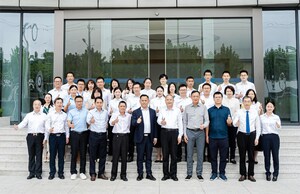CUBIC SENSOR & INSTRUMENT SHOWCASES EV BATTERY THERMAL RUNAWAY EARLIER DETECTION BY GAS SENSOR TECHNOLOGY AT SAE WCX 2022 - Booth #555
WUHAN, China, April 7, 2022 /PRNewswire/ -- Cubic Sensor & Instrument is showcasing a complete line of air and gas sensing technologies at Booth 555 at the SAE World Congress in Detroit, Michigan on April 5th through April 7th.
The Automotive Industry is seeing unprecedented growth in electric and hybrid vehicles. A culture of sustainability for future generations is driving car consumer vehicle purchasing trends away from conventional internal combustion engines towards greener choices like EV and Hybrid vehicles.
Automotive OEMs and tier-level suppliers are constantly innovating and developing battery technologies that can increase the vehicle driving range and shorten charging times. With the push to increase vehicle driving range and shorten charging times, thermal management of battery systems has become a critical topic with the goal of ensuring occupant and vehicle safety.
What is Thermal Runaway?
Increasing the driving range of vehicles can be achieved in multiple ways. The most common methods are: leveraging larger battery packs with more modules & cells, and implementing higher energy density cells. Regardless of how increased driving range is achieved, all battery systems are susceptible to thermal runaway.
Thermal runaway is when there is an internal short-circuit or failure within the battery or series of batteries that can lead to increased pressures and potential for combustion within the battery cell. This can result in the generation of smoke, fire, increased temperatures (up to 1,000˚C) or even explosion.
Battery Thermal Runaway Challenges
Thermal runaway of single battery cells within a large-scale lithium-ion battery is a well-known risk that can lead to critical situations if no counter measures are taken in today's lithium-ion traction batteries for battery electric vehicles, plug-in hybrid electric vehicles and hybrid electric vehicles. Fast and reliable detection of faulty battery cells undergoing thermal runaway within the lithium-ion battery is therefore a key factor in battery designs for comprehensive occupant and vehicle safety.
How Can Cubic "Solve" These Applications?
There are myriad case studies and white papers that have done in depth research and analysis on thermal runaway in EV and Hybrid vehicle battery systems. The goal of these case studies and white papers has been determining the best sensing methodology for early detection of thermal runaway. Plenty of global studies have shown that there is no single appropriate sensor for thermal runaway detection could identify all risks under different scenarios and each single sensor will have its own challenges and disadvantages. Depending on the battery design, a combination of two or more sensors are necessary to create a detection system to eliminate the shortcomings of a single sensor and improves the reliability of the entire system for thermal runaway applications.
Regardless of the failure mode – battery abuse, overheating, overcharging and nail penetration testing – carbon dioxide (CO2) was the leading indicator for thermal runaway and was present in the vent gas of the battery systems. This rapid increase of measured CO2 was followed by a subsequent increase in vent gas temperature and pressure to include the presence of carbon monoxide (CO) and volatile organic compounds (VOCs).
As one of the leading gas sensor manufacturers, Cubic Sensor & Instrument has commercialized an innovative and flexible earlier thermal runaway detection platform based on complete multi-technology platform of combination of NDIR, laser scattering, MEMS MOx and etc. This platform allows the OEMs or tier-level suppliers the ability to create early-warning detection systems for EV and Hybrid vehicle thermal runaway specific to the vehicle platform by measuring gases, temperature, pressure and aerosol particles.
Based on core sensing technologies, Cubic ODM capabilities are also second to none – lots of OEMs or tier-level suppliers have benefitted from Cubic multiple detection principles as well as flexible and fast Engineering and Manufacturing capabilities.
Cubic Sensor & Instrument Application Focus
The comprehensive technologies are designed to support emerging automotive application needs as well as some of the most difficult and cost-constrained air and gas detection applications. These technology platforms can be applied to:
- EV Battery Thermal Runaway
- Child Left Behind Detection
- EV HVAC System Optimization
- Automotive Refrigerant Leak Detection
- Driver Alertness Monitoring
- Cabin Air Quality Monitoring & Improvement
- Exhaust Gas Analysis
SOURCE Cubic Sensor and Instrument Co.,Ltd.

WANT YOUR COMPANY'S NEWS FEATURED ON PRNEWSWIRE.COM?
Newsrooms &
Influencers
Digital Media
Outlets
Journalists
Opted In





Share this article